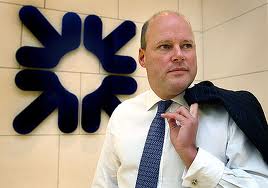

Because RBS remains a huge bank, despite Hester’s heroic attempt to shrink it, and is therefore hugely important to the UK’s small businesses (which comprise most of the agency sector) and the economy as a whole. If it lends to consumers as well as businesses then the economy will finally start to grow and everyone will breathe a sigh of relief.
Hester has been defenestrated because he’s supposedly unwilling to commit himself to a further long stint as the bank is privatised. But he himself has said he doesn’t want to go and was willing to see privatisation through.
Reading between the lines, it’s clear that Osborne wants to unload the bank before the next election at any price so he can win political points (possibly by offering shares to the public at a deep discount) whereas Hester wants to get taxpayers’ money back – all £45bn of it.
It’s amazing that Hester has stuck things out for five years: every year he’s been hammered over his bonus (which, mostly, he’s not taken) and suffered various politicos meddling in the bank; most latterly an Osborne-appointed committee of the great and good (including Margaret Thatcher’s former chancellor Lord Lawson) who, quite bizarrely, have demanded that RBS be split into a good and bad bank (the latter with the remaining dubious loans in it).
This may have made sense when or shortly after the stricken bank was part nationalised. But it makes no sense now; when Hester (who deserves a knighthood and the thanks of Parliament rather than all this crap) has cleaned out most of the bad stuff.
It may be that Osborne, who doesn’t want to split the bank either – he just wants to flog it, has thrown Hester overboard to get the committee off his back. They may think, foolishly, that a new man would take a more sympathetic view of their hare-brained scheme. But one’s left with the overwhelming impression that chancellor Osborne is a menace. He’ll do absolutely anything to win a few more votes for the Tories.
As for Hester he’d make a bloody good new chairman of WPP. He knows all about the fallout from bonuses (WPP CEO Sir Martin Sorrell trousered £17.6m last year); more pertinently the rambling WPP does rather resemble RBS in the Fred Goodwin era, when its balance sheet was about three times that of the UK economy, the sixth biggest in the world.
WPP is nowhere near as big as that, of course. But there’s more than a surface similarity.










I think you are right. Mr Hester has done an extraordinary job of steadying what, to all intents and purposes, was a fast sinking ship, holed well below the waterline. To do that, whilst contending with constant carping and interference is truly remarkable. I suspect you are right also about the government’s motivation in moving him along – he wouldn’t approve of a fire-sale for political reasons and would argue publicly against it on the grounds that it would be difficult to get full price back. Most inconvenient for politicians that have never run any business before. Are people really stupid enough not to realise that we have already bought the bank once? With tax money. Our money. There is no such thing as government money. But they’re going to sell it back to us.